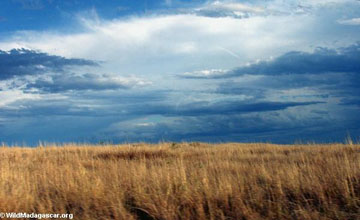U.S. grazing lands at risk due to rising CO2 levels
U.S. grazing lands at risk due to rising CO2 levels
mongabay.com
August 27, 2007
Rising carbon dioxide levels could cause significant changes to open grazing lands and rangelands around the world, reports a study published in the journal Proceedings of the National Academy of Sciences (PNAS).
Using an experimental field station in the Colorado shortgrass steppe to determine the effects of CO2 on plant species composition, researchers led by Jack Morgan of the United States Department of Agriculture found that elevated carbon dioxide levels drive an increase in small woody shrubs in grass-dominated open rangelands. The results suggest that “CO2 is contributing to the replacement of grasslands with shrublands unsuitable for forage, bringing with it biological and economic impacts,” according to PNAS.
The authors say the finding that Artemisia frigida, a woody shrub commonly described as a weed, does particularly well under increased CO2 levels may have serious consequences for livestock ranching in the American Great Plains.
 Grasslands. Photo by Rhett A. Butler |
“A. frigida tends to increase under heavy grazing and other disturbances, is unpalatable to livestock, invades deteriorated grasslands, and is considered a weed,” write the authors. “It is also one of the least desirable Artemisia species for wildlife.”
“Our results, which indicate that growth of A. frigida can be enhanced dramatically simply by increasing ambient [CO2], suggest that rising atmospheric [CO2] already may be causing important changes in the ecology of the semiarid grasslands of the western Great Plains.”
CITATION: Jack A. Morgan, Daniel G. Milchunas, Daniel R. LeCain, Mark West, and Arvin R. Mosier (2007). Carbon dioxide enrichment alters plant community structure and accelerates shrub growth in the shortgrass steppe. PNAS Early Online edition www.pnas.orgcgidoi10.1073pnas.0703427104